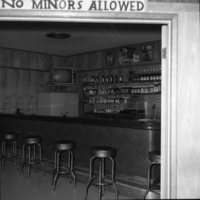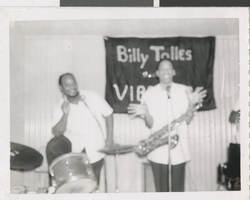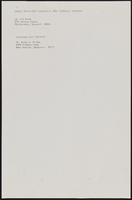Search the Special Collections and Archives Portal
Search Results
Easter Parade at Rubens; L.T. Mason at Doolittle and Malvern; Bunny Hop at El Morocco; Mr. and Mrs. Simmons at 308 Jackson Street; girls coloring eggs at Doolittle : photographic negative, 1965
Level of Description
Archival Collection
Collection Name: Clinton Wright Photographs
Box/Folder: Box 01
Archival Component
Audio recording clip from an interview with Hazel Geran
Date
Archival Collection
Description
Part of an interview with Hazel Geran by Claytee D. White on August 30, 2000. Geran talks about The Cove Hotel and Jackson Hotel on Jackson Street.
Sound
Jackson Street
Authority Link
No description.
Latitude/Longitude
Broader
Feature
Geographic Location
Dorothy, Alice, and Marva Love oral history interview
Identifier
Abstract
Oral history interview with Dorothy, Alice, and Marva Love conducted by Claytee D. White on February 11, 2015 for the African Americans in Las Vegas: a Collaborative Oral History Project. In this interview, Dorothy discusses her personal history and moving to Las Vegas, Nevada in 1961. She describes the city at the time, living in West Las Vegas, and raising her children there. Alice and Marva, Dorothy's daughters, then talk about their educational experiences in Las Vegas and growing up in the Westside community. Later, Dorothy describes starting her family business, Love’s Cocktail Lounge, on Jackson Street and what it provided for the Westside community. The family recall the entertainers that performed at Love's Cocktail Lounge and the eventual downfall of Jackson Street. Lastly, they discuss the development and changes in the Westside.
Archival Collection
Yolanda Rayford oral history interview
Identifier
Abstract
Oral history interview with Yolanda Rayford conducted by Claytee D. White on August 11, 2015 for the African Americans in Las Vegas: a Collaborative Oral History Project. In this interview, Rayford discusses her personal history and what it was like to have a parent in the armed services during her youth. She talks about living in Tokyo, Japan while her father was stationed there and describes life on the military base. Rayford recalls moving to Las Vegas, Nevada in 1969 and describes the riots that were happening in West Las Vegas at the time. She goes on to talk about the entertainment on Jackson Street and discusses how Jackson Street was the downtown for the Westside community. Lastly, Rayford talks of her employment at the Nevada Test Site doing clerical work and the future of the African American community in Las Vegas.
Archival Collection
Julia Payne oral history interviews
Identifier
Abstract
Oral history interviews with Julia Payne conducted by Claytee D. White on February 11, 2004 and March 07, 2004 for the Boyer Early Las Vegas Oral History Project. In the first interview, Payne discusses arriving to Las Vegas, Nevada in 1961. She describes discrimination, redlining on the Westside, and recalls the lack of integration at the time. Payne then discusses Jackson Street and compares it to the Las Vegas Strip. Lastly, Payne talks about Cove Hotel, Hank’s Place, Colony Club, and the decline in African American businesses on Jackson Street. In the second interview, Payne discusses welfare rights, changes to the Westside and growth of suburban areas. She describes her employment with the Southern Nevada Drug Abuse Council and becoming the first African American substance abuse counselor. Lastly, Payne discusses her position as Executive Director of Nevada Treatment Center.
Archival Collection

Film negatives of the Cotton Bowl Bowling Alley, October 26, 1962
Date
Description
Series of negatives from Nevada State Museum of the exterior and interior views of the Cotton Bowl bowling alley and bar at 500 Jackson Street, October 26, 1962, taken for Nellie Price Brawner.
Image

Photograph of the Billy Tolles band at the Cotton Club, no date
Date
Archival Collection
Description
Black and white photograph of the Billy Tolles band playing at the Cotton Club. The Cotton Club was located at 500 Jackson Street and operated from 1944 to 1957.
Image
Henry Shepherd oral history interview
Identifier
Abstract
Oral history interview with Henry Shepherd conducted by Claytee D. White on October 22, 2014 for the Boyer Early Las Vegas Oral History Project. Shepherd discusses being an African-American bartender on the Las Vegas, Nevada Strip, hired as a result of the 1971 consent decree. He also recalls memories of Jackson Street, the homes in North Las Vegas, and the hotels in downtown Las Vegas and on the Strip.
Archival Collection

